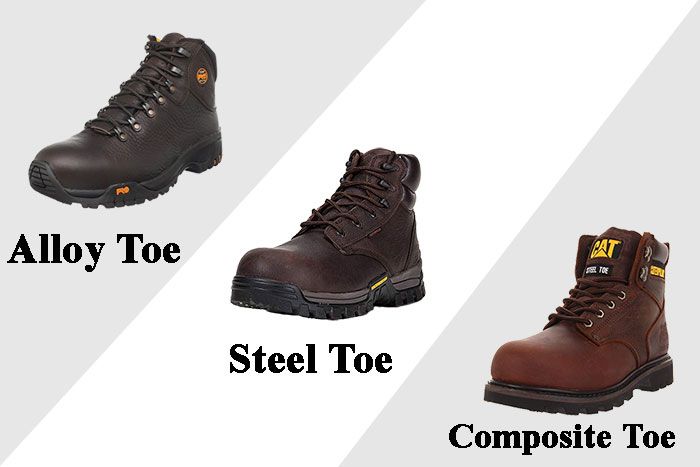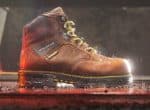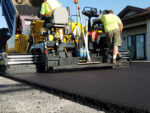For a long time now, I have been a part of the disputing discussion about which type of toe cap is the most comfortable to be in between composite, alloy, or steel, when it comes to work boots.
After doing extensive research on this I have come to realize that composite, alloy, and steel toe caps each have their strengths and weaknesses.

However, when it comes to the comfort factor – composite toe work boots are the clear winner here because they are lightweight, plus they can be worn during both hot or cold weather conditions as it does not become too hot or cold on the inside of the boots, or in short, provides better insulation. This just proves that you will be most comfortable in them throughout the day.
To give you a better understanding of the three types of toe caps, I will be covering all aspects of their material, advantages, and disadvantages in this article.
Work boots with Composite Toe
Material and design – Composite toe cap boots are made from a blend of non-metallic but tough materials nonetheless. The most ordinarily used materials are Kevlar, fiberglass, carbon fiber, or plastic.
They are designed for workers who have to be on their feet for long hours, which leads to fatigue and stress mainly on the leg and joints. We certainly want to avoid that while working so it doesn’t hamper our productivity.
Therefore, composite toe boots are made very light and comfortable. You can wear them all day comfortably. The toe caps are normally bulky which leaves less room for the toes to shimmy, and this can be an issue for some people due to discomfort.
Safety standards – When it comes to safety and protection, composite toe boots meet all the safety specifications set by ASTM international. They will protect your feet from moderate impact and compression, which means they cannot combat extremely heavy objects falling on them.
There is a good chance of the boots cracking if it does happen. In the case of repetitive impact and compression on the boots, its safety factor decreases because the material cripples on the inside without showing so much as a scratch on the exterior. So at best, they are reliable the first couple of times before you have to replace your boots with a new pair.
Protection – Due to the absence of metal in the boots, composite toes do not conduct electricity. Hence, it is a great option for people working in an environment that is susceptible to electrical hazards and for electricians as well. Even so, if you fall in this category, it is always safer to wear safety boots that have an EH rating for the added assurance.
Composite toe boots also have great weather resistance features due to being non-metallic. So, they do not conduct heat or cold easily, making them a better option for insulated boots. Meaning they don’t get too hot or too cold keeping your feet comfortable all through the day.
Advantages of a composite toe work boot
-
-
- They are lightweight and comfortable.
- There’s no metal, so, perfect for people who have to go through metal detectors at their workplace as it does not set them off.
- Protects you from electrical hazards as it does not conduct electricity.
- It does not conduct heat or cold, hence, gives you better insulation.
- Minimizes stress and fatigue for people working on their feet throughout the day.
- Great choice for electricians, engineers, airport staff, security crew, and the like.
-
Disadvantages of a composite toe work boot
-
-
- Provides moderate protection from impact, compression, and punctures.
- There is less space for the toes because the toe cap is cumbersome.
- Priced on the higher side.
- Unable to ride out awfully heavy objects falling on them, will lead to cracking of the boots.
- They have limited designs and styles due to their bulkiness.
- Not meant for construction workers, heavy machinery workers.
-
Work boots with Alloy Toe
Material and design – Alloy toe work boots are constructed from several different types of lightweight components like titanium, aluminum, and a few other similar lightweight material.
A lot of people are starting to prefer alloy toe boots due to their lightweight design, which gives them better movement throughout the day. Workers can also move faster in such boots.
You will be surprisingly more comfortable in them while working, walking, or if you have to be on your feet for extended periods of time at your workplace. The toe caps are made thin, so your toes can jiggle better with more space in there.
Safety standards – As you know apart from being comfortable in your work boots, it is also important that they can shield you from work injuries. Alloy toe boots will provide your feet with all the protection that is needed when working in an accident-prone workplace.
They meet all the safety standards set by ASTM international and OSHA, giving you peace of mind when working, thus better performance. Alloy toe caps have passed all the tests of protection against impact and compression that can be caused by heavy and stinging items falling on your feet.
Protection – If you work in construction, or deal with heavy machinery at your workplace, then you should consider alloy toe work boots. They can help you avoid severe foot accidents that may take place while working in case something hefty falls or rolls on your feet.
After all, you can never be too careful right? Although, they will not protect you from any electrical hazards as they do conduct electricity. Similar is the case with cold temperatures as they do conduct the cold, hence, your feet will get cold if you have to work outside in winters.
See also: Alloy Vs Composite Toe: Which Safety Toe Boot You Should Wear?
Advantages of an alloy toe work boot
-
-
- Lightweight and comfortable design.
- Gives you better freedom of movement while working.
- There is more space in the toe box for your toes to wiggle.
- Thin toe cap.
- Yields protection against hefty falling articles and stinging objects from piercing through your feet.
- Good option for manufacturing corporations, construction workers.
-
Disadvantages of an alloy toe work boot
-
-
- Very expensive, so not ideal for budget-conscious buyers.
- Not good for the electrical hazardous environment as it conducts electricity.
- Not good for winters as it conducts the cold temperature.
- It will set off metal detectors.
-
Work boots with Steel Toe
Material and design – Steel-toe work boots have been in existence since the early 1900s. It was the first type of safety work boots to make an appearance in the market for all the hardworking workers out there. They have served their rightful purpose for years on end till date.
They are made from robust steel material which offers the maximum protection against work accidents but also makes the boots quite heavy. This is definitely a problem for workers as it weighs them down while working, especially if they have a lot of walking to do.
Leading them to feel tired and exhausted sooner than they would like, hampering their performance. The toe cap is made thinner compared to composite toe which gives you ample toe room. Due to this factor, steel toe boots have the option of more styles and are not limited to just one type.
Safety standards – Steel-toe work boots meet or sometimes exceed all safety standards set by ATSM international and OSHA. This reason alone makes them the most dependable type of safety footwear there is for people working in a hazardous environment that is very exposed to accidents.
Steel toe have passed every type of test for safety and protection against impact and compression caused by heavy items falling on your feet and also from sharp things penetrating through.
Protection – Steel toe boots are a great option for people working in construction, manufacturing, heavy machinery industries, and similar professions. It will help you prevent serious foot injuries in an unavoidable situation of something heavy falling or rolling on your feet.
Hence, best for workplaces with the maximum possibility of accidents. Metal is a good conductor of electricity, so it is not the ideal choice for protection against electrical hazards. Similarly, it is not good for the winters or extremely hot weather as it conducts both cold and heat.
Advantages of a steel toe work boot
-
-
- Maximum protection from workplace accidents such as heavy objects falling or rolling on your feet.
- Shields your feet from something sharp piercing through.
- Most steel toe boots come with a metal midsole, so there is protection from getting punctured at the bottom as well.
- Best option for people working in construction, manufacturing, heavy machinery industries.
- Less expensive compared to composite and alloy toe.
- The toe cap is the thinnest.
- Abundant space for your toes to move about.
- Most dependable.
-
Disadvantages of a steel toe work boot
-
-
- Quite heavy so it weighs down the wearer.
- Cannot protect you from electrical hazards as it conducts electricity.
- Not the best for extreme cold or heat weather conditions.
- Due to being metal, it will set off metal detectors.
-
Wrapping up
It goes without saying that work boots are a necessity for any kind of workplace. Moreover, most companies have made it mandatory to wear suitable footwear that meets the basic safety standards set by the government. Especially for individuals working in accident-prone environments, safety toe boots are a requirement to provide feet protection and avoid injuries.
After considering all their advantages and disadvantages, what you should take away from this article is that it all boils down to the type of work you do and your work environment.
Make your choice depending on the level of comfort and protection you require at your workplace to have a more productive day. Even so, I would conclude by saying that if comfort is the main factor in a work boot for you, then you should without a doubt go for composite toe boots.







